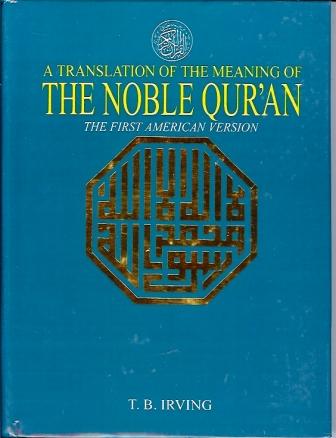The Noble Qur'an
The first American translation
The Bible as we know it, and as the Jews and Christians have known it, and especially knew it in the Prophet's days, is not as reliable as the Qur'an, and has let to constant variation, especially in its interpretation. thus despite the difficult relations that exist between the West and the Islamic Middle East at present the basic document for al sides to understand the latter area is the Qur'an, no matter how social scientists or theologians may try to interpret that part of the world after their own fashion.
Religion leads people to predictable action or reaction whent its principles govern the outlook of its followers. Thus the Qur'an is shunned or favoured insofar as its principles lend themselves to controlling human behaviour according to the morality or whims of those in power. Sacred symbols offer a way by which people can look at the niverse, give them a life style which tells them how things are and how they should be... However, translations by Muslims are not always acceptable. Muhammad 'Ali's is clear but his commentary and at times the English text can be affected by his sectarian tendency. Besides he has used Havas Arabic dictionary, and this is risky because of its hind thoughts carried over from Catholicism. A. Yusuf 'Ali's is more satisfactory as a commentary but his English is over ladden with extra words which neither explain the text nor embellish the meaning. True embellishment is the simple telling word which does not detract but carries the mind directly to the meaning.
Marmaduke Pickthall accomplished his labour in the East, and therefore his translation is in heavy Jacobean English laid upon a superstructure of Eastern preoccupations. The Koran by N. J. Dawood which is published in the Penguin series of World Classics is better than most, but it often becomes merely a prosaic paraphrase. Abd al-Majid Daryabadi is clear but hard to work with because of its arrangement, especially in the naming and numbering of chapters. Egyptian and Pakistani interpreters often show that they have not been talking to anyone outside of their own circle, and this lack has hurt even their political propaganda...
Since studies like Noldeke's and Bell's exist for those who need a barren type of criticism, it is not my purpose to follow in that line of research, but rather just as painstaking a one in trying to lay before the English-speaking world at the end of the twentieth century of their era, or the beginning of the fifteenth century of the Hijra, the message of the Qur'an in reverent yet contemporary English. My purpose is not to enter into theological controversy, nor to test the ancestry of ideas that can be found elsewhere. I will not indulge in refutation, especially of old chestnuts, but let the text and the message stand for themselves. This is a long and dignified tradition which should be made part of the world heritage in a universal age.
Arabic and English text
T. B. Irving
607 pages, hard bound
There is no reviews yet. Be the first to write us your opinion







